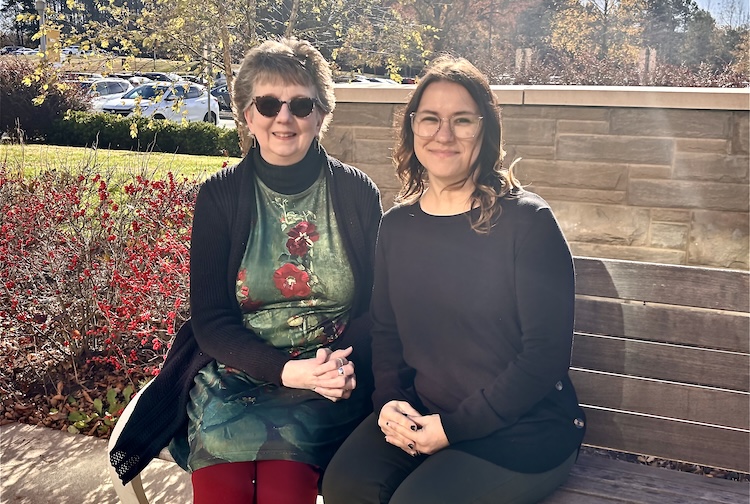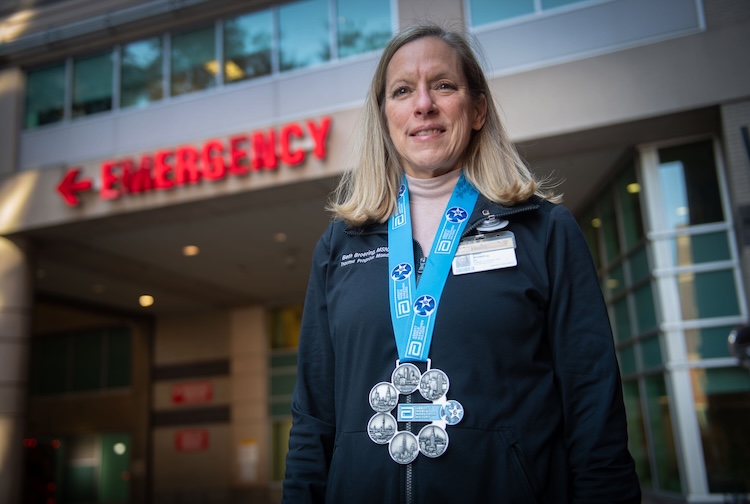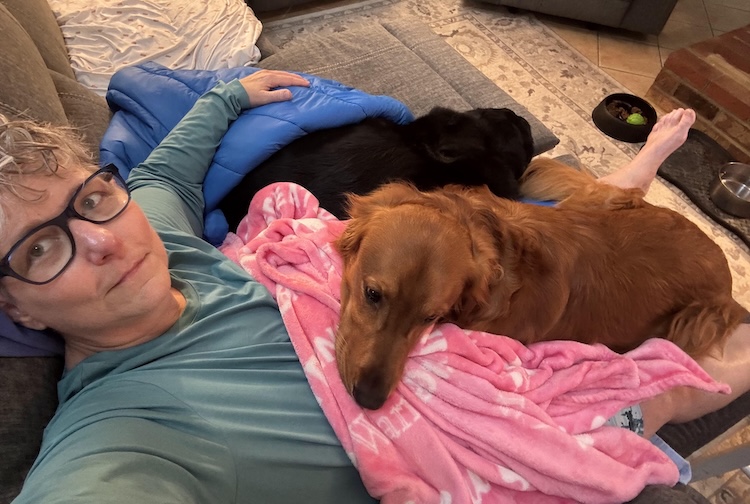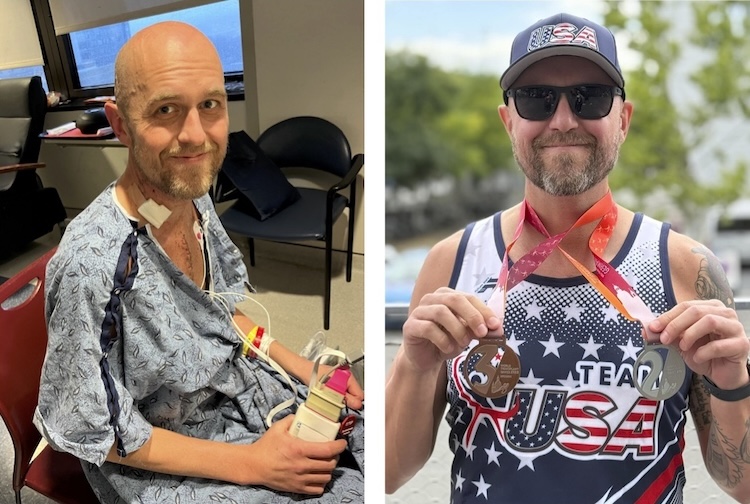Too young for a stroke? A 37-year-old Virginia woman says ’Think again!’
Stroke survivor encourages young adults to recognize symptoms and underlying health conditions that can cause stroke.
November 24, 2025 Donna Bartholomew, RN (left), stroke coordinator for VCU Health Community Memorial Hospital, and former patient Autumn Funderburk (right). (Shea Wright, Enterprise Marketing and Communications)
Donna Bartholomew, RN (left), stroke coordinator for VCU Health Community Memorial Hospital, and former patient Autumn Funderburk (right). (Shea Wright, Enterprise Marketing and Communications)
By Shea Wright
What started out as an ordinary drive to work for Autumn Funderburk turned into a life-changing moment.
“I noticed numbness in my face and weakness in my right arm as I was pulling into the office parking lot,” said the 37-year-old crisis nurse supervisor. “I thought, ‘There’s no way I’m having a stroke at my age,’ but something in me knew to get help.”
Autumn was able to signal to a coworker that she needed immediate medical attention, and they drove her to VCU Health Community Memorial Hospital (CMH) in South Hill, Virginia. Within minutes of arriving, she was evaluated and underwent a CT scan. The tests confirmed exactly what Autumn suspected: She experienced a mild stroke.
A stroke occurs when a blood vessel that carries oxygen and nutrients to the brain becomes blocked or bursts. When that happens, brain cells begin to die within minutes. Early detection and treatment are an important part of accelerating recovery times.
Patients who seek care quickly, like Autumn, have more treatment options available to them. Autumn was given an IV injection of tenecteplase (TNK), which is often administered within 4 and a half hours after stroke symptoms occur.
Donna Bartholomew, RN, CMH’s stroke coordinator, knows first-hand that having close collaborations within a health system can help critical care patients get treatment quickly.
“CMH is a Primary Stroke Center, that means when a potential stroke patient arrives, we evaluate them within 10 minutes, perform a CT scan within 20 minutes, and can administer medication like TNK within 60 minutes,” she explained. “Most stroke patients can be seen and treated at CMH. If further evaluation or more critical care services are needed, we can have them in the air to Richmond within 90 minutes [of their arrival to the hospital].”
That rapid response for more complicated stroke cases is made possible because CMH is part of VCU Health. The close connections between hospitals allow stroke patients to be easily transferred – by medical flights or ground transportation – from CMH in South Hill to VCU Medical Center in Richmond, home of the first the first Comprehensive Stroke Center in Virginia.
Since the stroke program’s inception at CMH, clinicians across both the South Hill and Richmond campuses collaborate closely to determine the level of severity of each patient’s case. Specialists in Richmond’s main hospital can also speak directly with CMH medical staff and patients, ensuring they receive advanced care without delay. “The transition process across our health system is seamless from one facility to the next,” Bartholomew said.
When specialists determined Autumn needed further evaluation into the cause of her stroke, she was flown by helicopter to VCU Medical Center. Before the transfer, she was evaluated by her doctor at CMH who was connected with a neurologist from the VCU Health Comprehensive Stroke Center.
“I hadn’t accepted that I had a stroke at that point. But I had to trust that my life was in the very best hands,” she said. “I was lucky too. I was still at CMH and had familiar faces, people who knew me, worked with me and cared about me around me. I trusted that I was receiving the best care. That made all the difference.”
In small towns, caregivers often wear two hats as medical professionals and neighbors. As a result, there can be a delicate balance between maintaining professionalism and offering personal compassion that defines rural healthcare.
“I remember the air medical team coming in and walking me through the process of what was going to happen before I was transferred onto the helicopter. It was the scariest moment of my life,” Autumn said. “But I am grateful to my friends and colleagues for their encouragement in those first few minutes. Everyone was calm, reassuring, and professional. Every single person, from the phlebotomist to the security guard, played a part in keeping me safe.”
Within 24 hours of receiving life-changing treatment, Autumn was feeling like her old self, with only mild weakness in her right hand. That early action from the CMH’s stroke care team and access to VCU Health’s Comprehensive Stroke Center allowed Autumn to be transferred seamlessly between hospitals within one health system to receive advanced treatment.
Know stroke warning signs
Autumn's stroke led to the discovery of an underlying heart condition that may have been the initial cause of her stroke. Underlying health conditions can increase stroke risk, such as heart disease, high blood pressure, diabetes and obesity. Lifestyle choices can also play a role, like smoking and drug use.
Now under the care of a cardiology and structural heart specialist in Richmond, Autumn continues to navigate her recovery while balancing life and work in South Hill, all while hoping to use her experience to raise awareness.
“Strokes aren’t just something that happens to older people,” she said. “They can happen to anyone. Knowing the signs and acting fast saved my life.”
Signs of stroke can be broken down with a simple acronym – FAST – which stands for:
- Face - Face drooping
- Arm - Arm weakness
- Speech - Speech difficulty
- Time - Time to call 911 immediately
Each second matters from the time someone begins to experience stroke symptoms to when they get medical care.
“I don’t take time for granted anymore,” she shared during a panel for the 2025 VCU Health Comprehensive Stroke Symposium. “I want the younger generation to know how to listen to their bodies and speak up if you feel something isn’t right. You never know when one event could change everything.”
Discover what makes VCU Health a leader in stroke care, education and research
Check out more stories about VCU Health Community Memorial Hospital




